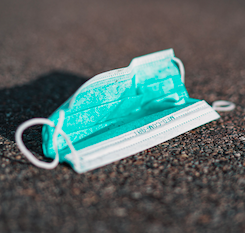Police Brutality in Nigeria
by: Sarah Smith
| Nigeria's First COVID-19 case was discovered on 27/02/2020 when an Italian citizen in Lagos, Nigeria tested positive for COVID-19. This was Africa’s first case of the novel coronavirus that would change everything from then on. At this stage, they were in a good position to handle the pandemic. The government of Nigeria imposed targeted lockdowns whenever there has been an increase of COVID-19 cases. There have also been curfews, and closures of interstate borders to try to reduce the spread of COVID-19. |
 A man proudly holds a Nigerian flag. A man proudly holds a Nigerian flag. |
|
The pandemic not only was a pandemic of COVID-19; it was also a pandemic of social justice issues, such as racism and police brutality. The pandemic affected many countries in many different ways. COVID-19 allowed for officers to have extra power over individuals. There are now police enforcing curfews, mandatory lockdowns, etc. This allowed for the police force to have an extreme amount of control over citizens, especially in Nigeria. The pandemic has brought light to unfair treatment of police towards citizens of Nigeria. “Governments in the region have declared restrictions for social gatherings, in a bid to upend the deadly contagion, rights violations of the vulnerable groups by law enforcement officials are on the increase. It argues that the underlying rationale for such flagrant abuse of power stems from the dearth of a rights- based approach to police-public relations.” (Amadasun, 2020)
|
 Nigerians wearing masks participate in a prayer walk. Nigerians wearing masks participate in a prayer walk. |
|
The COVID-19 pandemic has shed light on the issues and flaws of many leaders in Africa. “The COVID-19 pandemic has irrevocably shed light on the double standards, hubris, and despotic dispositions of many African leaders...Across the region there have been widely reported cases of violence against citizens by security forces who were deployed to enforce curfews and lockdowns. Suffice to underscore that such rights violations are not a matter of an isolated case, since deaths and injuries resulting directly from these excessive use of force have been reported in many African countries including Nigeria.” (Amadasun, 2020). COVID-19 rules and restrictions are supposed to help with survival and managing the virus; instead police are using it as an excuse to use force and harm citizens.
|
 Nigerians take a knee in hopes of fighting police brutality. Nigerians take a knee in hopes of fighting police brutality. |
|
The END SARS movement started during the midst of this global pandemic, similar to the BLM movement. SARS are a group of police officers, organized and formed in 1992, set to tackle criminals. The officers did not wear uniforms. There have been videos and eye witnesses of a SARS officer shooting a man before driving away. Police denied the incident. From that point on there have been social movements protesting against the police force SARS, similar to Black Lives Matter. At least 51 Nigerian citizens have been killed due to the peaceful protests regarding abusive police officers. Many are seen wearing masks and peacefully protesting the streets.
|
 Nigerians help push police car that was damaged in the midst of a protest against police brutality. Nigerians help push police car that was damaged in the midst of a protest against police brutality. |
|
“In Nigeria, there is a famous saying that police are not your friends.” (Umegbolu, 2020). In an article named End Sars: A revolution by the people for the people on police brutality in Nigeria, they discuss the issues regarding police brutality. The author discusses SARS and how it became a recurrent social injustice issue. Another video went viral of two police officers dragging two men from a hotel, and shooting one of the men. It is evident that police use their power for horrible abuse rather than good, and COVID-19 has only magnified their power. They will shoot at protesters and light off tear gas to stop them. It is beyond clear that COVID-19 has only magnified police brutality issues within Nigeria.
|
 A prison in Nigeria. A prison in Nigeria. |
NEXT PAGE: POLICE BRUTALITY IN ROMANIA
Bibliography
"Nigeria Says Dozens Dead in Unrest over Police Brutality | CBC News." CBCnews. October 23, 2020. Accessed December 02, 2020. https://www.cbc.ca/news/world/nigeria-police-protests-endsars-1.5775084.
Adepoju, Paul. "Nigeria Responds to COVID-19; First Case Detected in Sub-Saharan Africa." Nature News. March 11, 2020. Accessed December 02, 2020. https://www.nature.com/articles/d41591-020-00004-2.
Umegbolu, Chinwe. "End SARS: A Revolution by the People for the People on Police Brutality in Nigeria." The University of Brighton. October 21, 2020. Accessed December 02, 2020. https://research.brighton.ac.uk/en/publications/end-sars-a-revolution-by-the-people-for-the-people-on-police-brut.
Eranga, Isaac Omo-Ehiabhi. "COVID-19 Pandemic in Nigeria: Palliative Measures and the Politics of Vulnerability." International Journal of MCH and AIDS. 2020. Accessed December 02, 2020. https://www.ncbi.nlm.nih.gov/pmc/articles/PMC7359756/.

